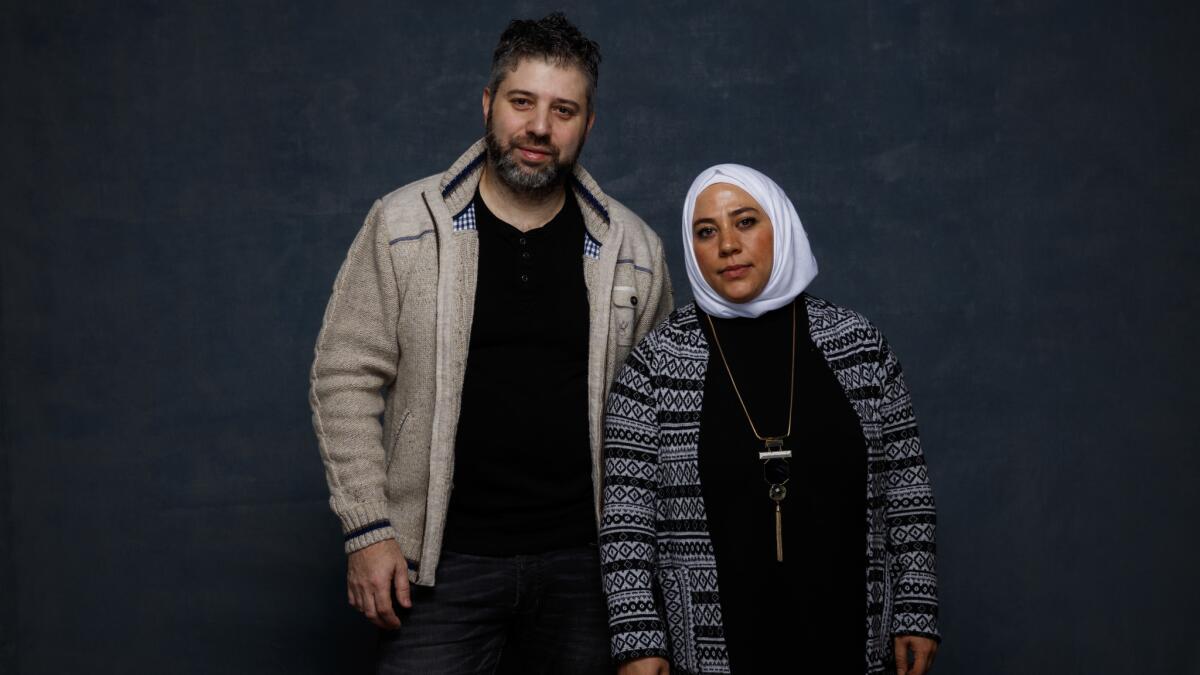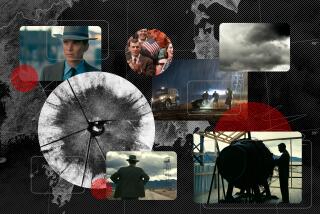As ‘Cries From Syria’ debuts, a refugee seeks to make her voice heard

Reporting from New York — Syrian journalist and activist Kholoud Helmi was struggling with her emotions.
“It’s too much sometimes,” she said. “I feel like a chocolate that has a shell outside but inside it’s hollow. People don’t want to hear the pain. And if I cry days and nights it won’t change anything.”
Helmi, from the Damascus suburbs, could be forgiven her tears. Her brother long ago went missing and is feared dead in the nearly six-year-old conflict; an uncle, cousins and many friends have been killed.
“Sometimes you lose control. And then you go to bed, hug your pillow, weep and get up and don’t show any of it when you get up the next day,” Helmi said in flawless, accent-free English in an interview.
The 33-year-old, a short dynamo in a head scarf who manages to pull off spry and gravitas at the same time, is a key subject in “Cries From Syria,” Oscar nominee Evgeny Afineevsky’s harrowing new documentary about the conflict’s victims. She was in a side room at the Council on Foreign Relations last week after a screening of the film.
When it premieres on HBO on Monday night (it will re-air several times in the coming days), “Cries From Syria” will show a side of the war few Americans know or are willing to expose themselves to. The movie is graphic, even by the gruesome standards of the unfortunate subgenre of Syrian war documentaries. A father tries to save his children on a rickety boat as one by one they drown. A school is razed by a missile. A town filled with children is decimated by a chemical attack.
Before the screening, Sheila Nevins, HBO’s documentary chief, took the stage. “I’m glad you’re laughing now because you won’t be laughing later,” she said to a smattering of nervous laughter.
The audience then watched silently and sometimes weepily as Afineevsky and a battalion of citizen journalists showed the victims, particularly children, caught in the vise of Bashar Assad’s military in its conflict with the Free Syrian Army, the Syrian Democratic Forces and various jihadi groups.
With the death toll approaching half a million and the displaced topping 6 million, the conflict has long descended into humanitarian catastrophe, and the audience watched children talk about the loss of dreams and a reason, even slightly, for hope. (Filmmakers have sought to explore various angles of the issue: Sundance saw the debut of several movies, including “Cries,” Matthew Heineman’s ISIS-oriented citizen-journalist tale “City of Ghosts” and Firas Fayyad’s “Last Men in Aleppo,” which won a grand jury prize. Last month at the Oscars, “The White Helmets,” about the rescue workers in particularly violent areas of Syria, took home the prize for documentary short.)
After the “Cries” screening, a panel of experts joined Helmi and Afineevsky at the front of the room. “I challenge anyone to see this movie and not understand why people are fleeing,” said Ciaran Donnelly, a senior vice president at the International Rescue Committee, addressing the Western backlash to refugees and the presidential travel ban that it engendered.
Afineevsky, the Russian American filmmaker who earlier in the day had recorded “Charlie Rose,” explained why he shifted from the Ukraine setting of his “Winter on Fire.”
“This is a refugee crisis the world has not experienced since the Second World War,” he said. “I needed to go back in history, like a time machine, and find out, in-depth, why so many people were leaving their homes.”
He added, “We, through the press, have fear of this people. In order not to have fear I made this movie.”
Someone in the audience asked whether the Trump administration would take a more aggressive approach in Syria to halt the atrocities. “Trump is not a reversal of Obama — he’s a doubling down of Obama,” demurred Philip Gordon, a senior fellow at the Council.
The room grew especially quiet when Helmi spoke. She laid out the endgames being played by various leaders. The moderator asked her whether she felt the U.S. government was supporting opposition groups.
She paused and her voice grew quiet and laden with meaning. “No,” she said.
Helmi lives in Turkey now, where she is instrumental in refugee causes including schools and newspapers — part of a band of women in the refugee underground, many of whom have lost children, trying to rebuild Syria in absentia.
She said her work is aimed at future generations; she believes anyone of a certain age now has lost its opportunity amid the violence and displacement.
“I lost the whole universe when I left,” she said. “But I believe I’ll be back to Damascus one day. I really do. At that point I won’t feel so much like I lost my hometown or lost so many people.”
She managed to keep some moments of humor through the pain. “The last time I came to the U.S. [at Sundance] the president signed a travel ban two days later. And now,” she said, alluding to Trump’s reissued executive order, “I’ve come again, and he’s signed another one.
“Maybe,” she added drolly, “I should stop coming to the U.S.”
See the most-read stories in Entertainment this hour »
Twitter: @ZeitchikLAT
More to Read
Only good movies
Get the Indie Focus newsletter, Mark Olsen's weekly guide to the world of cinema.
You may occasionally receive promotional content from the Los Angeles Times.









